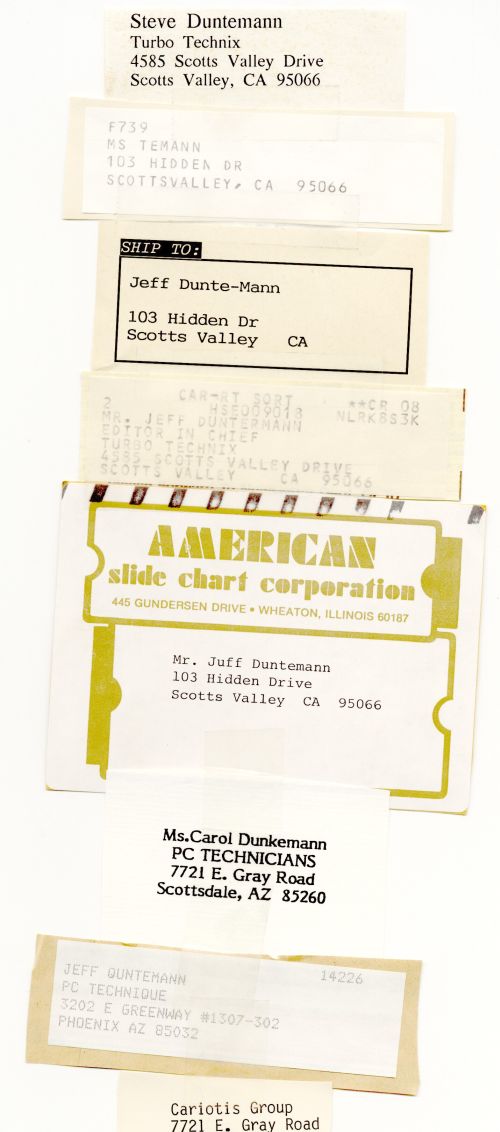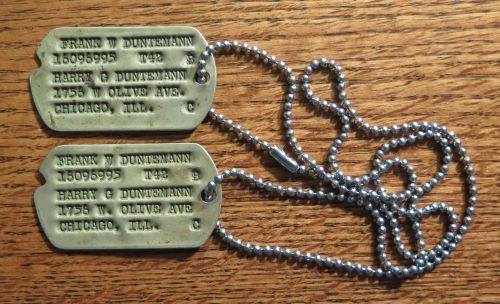
Yesterday would have been my father’s 96th birthday, except that he died forty years ago last Tuesday. I posted a brief item on Facebook about him yesterday, in which I promised an excerpt from my memoirs about how my father smuggled a half-grown mongrel puppy home from the radio/radar base in Mali where he served out the last eighteen months of WWII. The photo above was taken shortly after his return from the War in October, 1945.
As most of my readers here now know, my father was a 5′ 6″ bundle of cussedness and raw muscle. He took a lot of crazy chances and rarely got caught. When he did get caught (as he did when he ran away from home to join the Army when he was an underage 16) the consequences were minor, although he doubtless caught hell from his father. When his father ordered him to break it off with the south-side Polock girl he was dating, Frank W. Duntemann laid it out for my grandfather, who was a big wheel at the First National Bank of Chicago: “Pops, I’m going to marry Victoria, and I’m going to Georgia Tech on the GI bill and become an engineer. I will not become an accountant and spend the rest of my life counting other people’s money. If you want me to come back from Georgia–and if you want to see your grandchildren–you’d better get with the program.”
Harry Duntemann, perhaps sensing that he was reaping in his only son what he had sowed, blinked. And so Frank did come back an engineer, he did marry Victoria, and my sister and I happened. (Alas, Harry died just two months before my sister, his only granddaughter, was born.) I inherited my father’s skill at writing (we found his love letters to my mother after she passed away in 2000; the man was good) but I got little of his muscle and less of his cussedness. That’s ok; I feel that I got the best of what both my parents had to offer. I’m proud of his adventures. As they say, That’s my old man!
The text below is from my memoirs, Kick Ass. Just Don’t Miss:
With the war over, my dad knew his days at the weather station in Africa were numbered. He had gotten pretty attached to Willie, and was determined to get him back to Chicago somehow. Come October 1, the date was announced: On 10-7-1945 he was going home.
Willie came along.
As the story was told at our house, my dad asked for some sleeping pills, which were given liberally when requested. The morning the planes arrived for his group, he took Willie around for one last chance to squirt his ancestral haunts. Then he gave the poor dog a couple of the pills. It wasn’t a shot in the dark on the dose; my father had a scientific turn of mind and he had already run the experiment. Willie had responded as expected. One pill made him wobbly. Two knocked him out pretty cold. Frank wrapped him in a towel and stuffed him in his barracks bag. He then queued up with his comrades to board the C-47s (the military version of the famous DC-3) for home.
It was a long flight. I have a note among the many sent me by Aunt Kathleen saying that the first leg of the flight was from Mauritania in Africa to South America. I imagine, knowing what I do about the C-47, that it wasn’t nonstop. The aircraft probably landed for refueling in the Cape Verde islands, though where it stopped in South America has been lost to history. (I asked Aunt Kathleen and she didn’t know.)
I got the impression that the trip back wasn’t as focused and orderly as the trip overseas in 1942, which my father made on a ship. The planes were packed with sweaty GIs and their barracks bags. Canned rations were handed out liberally. I have no idea what sort of sanitary facilities that kind of plane had. My guess is that between the GIs, the bathrooms, the rations, and the general racket of military planes, Willie was barely noticed, and may have been a welcome distraction. Dogs are good that way.
The C-47 cruised at about 200 MPH, and stopped frequently to refuel. I’m guessing that Willie got water and K-rations on the trip, and potty breaks when the GIs were allowed to deplane and stretch their legs. Supposedly, on the last segment of the flight, my dad ran out of sleeping pills, and Willie arrived on American soil grouchy and fully awake.
Whatever base acted as the entrance portal (we have nothing firm on this, though I vaguely recall South Carolina mentioned) when the C-47 landed, the GIs got out and queued up for processing from military to civilian transportation. My dad noticed that everyone’s barracks bags were being searched for contraband.
Ulp.
What to do, what to do… There was a chain-link fence at the edge of the airfield, and the bored GIs were talking to a number of local girls who had come out to watch the planes-and the returning troops. My dad struck up a conversation with one of the girls, and asked her to move down the fence a little where they were less likely to be seen or heard. He asked the girl for an important favor, and stuck a dollar through the fence. I’ll bet she told the story as often in her later life as my dad told it in his: He tossed the squirming dog over the top of the chain-link fence, and she caught him on the fly. (Willie was small, not yet full-grown, at least part Dachshund, and did the girl the favor of not sinking his teeth into her.) My dad then got back in line, and she met him when he got through the checkpoint. As with a number of other crazy things my father did as a young man, he got away with it.
You’d think he would have gotten the girl’s name and address or kept in touch with her, but no: She kept the dollar, and my dad, with Willie in his barracks bag again, hopped a train for Chicago. They got home on 10-10-1945. Willie lived to the ripe old age of 17, and I knew him as a young boy.
I can’t imagine that the authorities who were mustering the soldiers out hadn’t thought of GIs throwing contraband over the fence. Fortunately for all concerned, I suspect they were interested more in weapons (or perhaps drugs) than dogs. And considering the number of Boomer friends of mine whose fathers brought home all sorts of small arms (and even rifles in some cases) I suspect the inspection point was a matter of policy, tempered or even mooted by the now-incomprehensible feeling of national relief that the War was at last over. Perhaps my father should not have worried:
“A dog? Super! Welcome home, Corporal, and welcome to America, Fido!”













